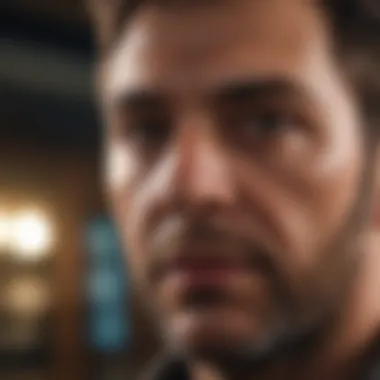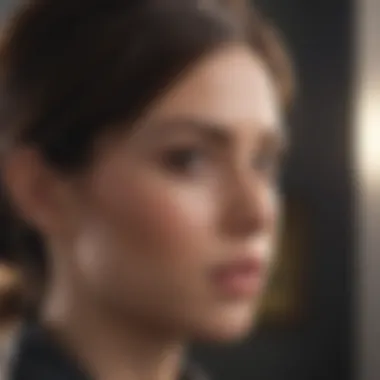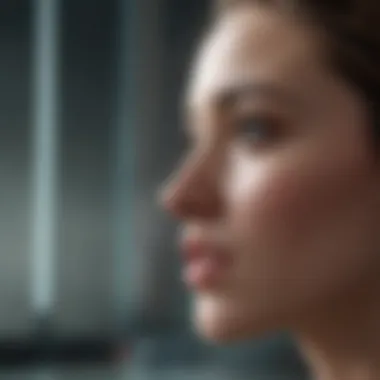Exploring the Impact of Face Off on Modern Viewership


Intro
The television landscape has transformed significantly over the past decade, with streaming platforms playing a pivotal role in shaping how audiences consume content. Face Off, a unique reality competition show, exemplifies this shift. Originally aired on Syfy, its move to Netflix marked a significant moment not only for the series but also for the perception of reality television as a genre. Understanding the nuances of this transition offers valuable insights into modern entertainment and viewer engagement.
In this article, we will analyze the intricate relationship between Face Off and Netflix. Key aspects include the implications of its streaming availability, its contributions to the reality TV landscape, and the evolving dynamics of viewer interactions with the show. Such an examination reveals the broader trends within digital streaming and how they impact contemporary media consumption.
Industry Insights
Evolving Trends in Reality Television
Face Off introduces an intriguing case study within the context of modern reality television. Its availability on Netflix has enhanced its reach and accessibility. With the rise of streaming services, viewers have become accustomed to on-demand content. This shift allows for deeper engagement with shows, as audiences can revisit episodes at their convenience. The format of reality TV is affected by this demand, as producers have adapted programs to cater to binge-watching habits.
The Role of Streaming Services in Viewer Dynamics
The format of Face Off benefits immensely from the Netflix model. Most notably:
- Binge-watching: Audiences can consume multiple episodes in one sitting, influencing the narrative pacing and flow of competition.
- Global Accessibility: Viewers from various countries can interact with the show, creating diverse fan communities.
- Algorithmic Recommendations: Netflix leverages user data to suggest similar content, thus widening the audience for Face Off.
This shift creates a more personalized viewing experience. It is crucial for producers to consider these factors when developing new content.
Viewer Engagement Strategies
Netflix provides tools to enhance viewer engagement, such as discussion forums or social media tie-ins. These interactions foster a sense of community among fans. Engaged viewers are more likely to promote shows they enjoy, yielding organic growth in popularity. Such phenomena illustrate the impact of engagement strategies on contemporary reality television.
"Streaming platforms have revolutionized viewer dynamics, making content more accessible and increasing engagement opportunities for shows like Face Off."
In summary, Face Off illustrates the potential for reality television to adapt and flourish within the streaming model. As we proceed, we will explore specific reviews, recommendations, and their implications on the broader landscape of entertainment.
Prelims to Face Off
The introduction of this article serves as a crucial segment for understanding the broader implications of the show "Face Off" in the realm of reality television. This section aims to orient readers to the uniqueness of the show and its contributions to the entertainment landscape. Highlighting the show's inception and development offers insights into how it has evolved, both in format and viewership, since its debut.
Overview of the Show
"Face Off" premiered in 2011 and quickly distinguished itself as a groundbreaking competition series focused on special effects makeup artists. Contestants compete in challenges to create stunning visual effects that bring various characters and scenes to life. Each episode showcases the artists’ abilities in areas such as prosthetics, creature design, and beauty makeup. Notably, the show's format encourages both creativity and technical skill, allowing viewers to appreciate the art form on multiple levels.
The series not only emphasizes individual talent but also fosters a sense of community among contestants. The presence of esteemed judges from the industry adds credibility to the competition. This dynamic enables audiences to connect personally to the artists' journeys, as they navigate the pressures of each challenge. It cultivates a professional and yet personal narrative, engaging viewers on multiple levels.
Significance in Reality TV Landscape
In the context of reality television, "Face Off" plays a critical role by redefining how competitions are showcased. Unlike conventional reality shows that often prioritize drama or interpersonal conflicts, "Face Off" focuses on artistry and craftsmanship. This shift represents a broader trend in reality television, as audiences increasingly gravitate toward content that combines entertainment with education.
The show has influenced the reality TV landscape by popularizing a niche genre focused on artistic competition. In doing so, it has opened doors for similar shows exploring specialized skills, such as baking or fashion design. It invites audiences to celebrate not just the outcome but also the creative process involved in producing compelling visuals.
Furthermore, the success of "Face Off" highlights the demand for programs that appeal to audience's aspirations. Viewers appreciate the effort that goes into challenges and the transformative experiences of contestants. This engagement is vital in cultivating a loyal fan base and encouraging discussions around the show.
"Face Off has effectively blended competition with artistry, setting a new standard in reality television."
Ultimately, understanding the show’s significance in the landscape of reality TV contributes to our appreciation of its impact, especially as it transitions to platforms like Netflix.


The Concept Behind Face Off
The concept behind the show serves as a crucial element in understanding its overall impact. The format incorporates unique aspects of competition alongside artistry, providing both entertainment and a showcase of skill. Each episode involves contestants facing off against each other in creative challenges centered around makeup effects and character design. This competition structure sets the foundation for viewer engagement and contest tension.
Competition Structure and Format
The competition in Face Off is organized into various rounds, with each challenge designed to test a different set of skills. Contestants are given themes or prompts, which require them to create costumes or makeup effects that are not only visually striking but also conceptually sound. The structure is as follows:
- Weekly Challenges: Each episode features a specific challenge that propels the narrative forward. Contestants often work under timed conditions, adding to the pressure and excitement.
- Judging: A panel of expert judges, consisting of notable figures in the makeup and special effects industry, assess the contestants’ work based on creativity, technical skill, and execution of the theme.
- Elimination Rounds: At the end of each episode, one or more contestants face elimination based on their performance, which keeps the stakes high and viewers invested.
This structured competition format creates a dynamic viewing experience. It encourages audiences to analyze the decisions and techniques used by contestants, fostering a deeper interest in the field of makeup artistry and special effects.
Profile of Contestants
The contestants of Face Off come from diverse backgrounds, reflecting a range of skill levels and artistic styles. This diversity adds depth to the show, allowing viewers to connect with several personalities, each bringing their unique perspective to the competition. Key points regarding the contestants include:
- Diverse Backgrounds: Many participants are professionals from the fields of visual arts, theater, and cosmetics. This diversity not only enhances the creative output but also educates viewers on varying artistic methodologies.
- Skill Levels: Contestants range from seasoned professionals with years of experience to emerging artists with fresh ideas. This blend ensures that the competition is not only about technical proficiency but also about innovation.
- Personal Stories: Often, contestants share personal narratives that resonate with viewers, making their journey relatable and engaging. This aspect of storytelling enriches the viewing experience and enforces viewer loyalty to particular competitors.
By showcasing a range of talents and perspectives, Face Off elevates the concept of reality competition shows by blending artistry with meaningful narratives. This thoughtful approach contributes to its status as a staple in both the reality TV landscape and among fans of pop culture.
The Transition to Netflix
The move of Face Off to the Netflix platform represents a pivotal moment in the show's journey and a significant shift in the landscape of reality television. Netflix operates on a subscription model, allowing viewers accessibility to a vast array of shows, including Face Off. This transition not only enhances visibility for the program but also aligns it with changing viewing habits. Audiences increasingly seek on-demand content, which suits the binge-worthy nature of Face Off.
A key consideration in this transition involves the broader implications for content distribution. Netflix’s algorithms curate personalized recommendations. This means Face Off can reach niche audiences effectively. As viewers become accustomed to tailored suggestions, the show gains the opportunity to attract new fans who may not have engaged with it previously on traditional cable.
Moreover, releasing entire seasons at once enables an immersive viewing experience. Viewers can engage deeply with the story arcs and characters, fostering a stronger connection to the material. This format contrasts sharply with traditional episodic releases, where audiences must wait weeks for a new episode.
Digital Streaming Dynamics
The digital streaming environment fundamentally alters how Face Off is consumed. The instant access to episodes encourages compulsive viewing patterns. A viewer might start with one episode and find it difficult to stop, thus binge-watching several in a single sitting. This dynamic allows for deep conversations and fan discussions online, as viewers consume content at a quicker pace.
Another critical aspect involves international reach. Previously, the show had limited availability on cable networks in certain regions. Now, viewers worldwide access Face Off directly through Netflix. This expansion amplifies its cultural impact, allowing audiences in countries where reality TV may not be as popular to discover the show.
Additionally, Netflix's model allows for both mainstream and niche programming. Rather than competing for advertising revenue with other shows, Face Off can carve out its place in the extensive Netflix catalog. This creates a unique space for it, free from the pressures of traditional TV metrics.
Changes in Viewer Demographics
The viewer demographics of Face Off have evolved since its transition to Netflix. The show attracts a diverse range of viewers, which can be attributed to Netflix's wide reach and targeted marketing. Audiences span various age groups and backgrounds, enhancing the show's communal experience.
Younger adults tend to favor streaming services like Netflix over conventional cable. Therefore, Face Off sees a shift in its core audience. The rise of millennials and Gen Z as core viewers means a growing interest in content that emphasizes creativity and skill.
Demographic data indicates an increase in female viewership as well. The show appeals to women interested in artistry, design, and horror genres, substantially broadening its audience base. This diversification means more significant discussion around themes present in the show and influences trends within the reality genre itself.
Viewer Engagement with Face Off
The concept of viewer engagement is vital to understanding how shows like Face Off have evolved in the digital age. Engagement extends beyond passive viewership; it involves active participation from the audience. This interaction can significantly influence the show's success and longevity. With the advent of streaming platforms, the dynamics of how viewers engage with content have changed drastically.
One of the core benefits of increased viewer engagement is the ability to foster a community around a show. Fans of Face Off connect not only through the excitement of the competition but also through shared interests in makeup artistry and special effects. The show's unique format encourages enthusiasts to discuss techniques, share their own creations, and even participate in fan events. This sense of belonging adds a layer of enjoyment to the viewing experience.


Moreover, the platform of Netflix presents new opportunities for viewer engagement. Unlike traditional broadcasting, it allows audiences to binge-watch seasons at their own pace. This freedom creates a communal experience where fans can consume content simultaneously, discuss episodes on social media, and react to developments in real-time.
Interactive Viewer Experience
The interactive viewer experience has become an integral part of how audiences engage with Face Off. This show not only captivates its viewers with riveting competitions but also invites them to participate in unique ways. For instance, viewers often find themselves urging their favorite contestants through their screens, particularly during intense elimination rounds.
Streaming platforms provide features such as behind-the-scenes content and interviews with contestants. This additional material enhances the experience, deepening the viewers' connection to the show. Fans can interact through comments on platforms like Reddit or discussions on forums, where they analyze episodes, critique performances, and speculate on outcomes. These interactions create lively discussions that significantly enrich the experience.
Social Media Influence
Social media platforms play a crucial role in shaping viewer engagement for Face Off. The popularity of the show has resulted in diverse Fan communities on platforms like Facebook, Twitter, and Instagram. These channels provide spaces where viewers can share their thoughts, artwork, and fan theories.
"Social media not only serves as a platform for fan interaction but also amplifies the overall reach of Face Off. Such engagement often translates to increased viewer numbers and sustained interest in the show."
The influence of social media on the viewer experience is particularly significant during seasons airing on Netflix. Fans create memes, share clips, and spread memorable quotes, turning moments from the show into viral content. This not only garners attention but also invites new viewers to join in on the conversation.
In summary, viewer engagement with Face Off has evolved into a multifaceted experience that transcends traditional viewing. From interactive experiences to vibrant social media discussions, both the show and its audience have shaped each other in profound ways. As a result, the dynamics of viewer engagement play a critical role in the ongoing relevance and appeal of Face Off in the realm of reality television.
Critiques and Reception
The critiques and reception of Face Off encapsulate the collective response to the show from viewers and critics alike. This evaluation is crucial because it reflects the show's influence in the reality television landscape and its capacity to engage audiences. Understanding these aspects contributes to a comprehensive analysis of how Face Off operates within the broader scope of modern media consumption. Viewer feedback and critical reviews intertwine to produce a nuanced view of the show's impact on pop culture and the evolving nature of entertainment platforms like Netflix.
Viewer Feedback
Viewer feedback serves as a window into the audience's perception of Face Off. Spectators share their experiences, preferences, and critiques, illustrating both the strengths and weaknesses of the show. Generally, fans laud the creativity and artistry displayed in the challenges, appreciating the innovative spirit that contestants bring. The incorporation of diverse genres and technical skills has resonated with many viewers, fostering a deeply engaged community.
Despite this, there are points of contention. Some viewers express concerns about the competition format, arguing that the eliminations can be emotionally charged and disheartening. This juxtaposition of enjoyment and emotional investment highlights the show's complex relationship with its audience. In recent seasons, the show's accessibility on Netflix has led to an influx of new audience members, sparking discussions across various online platforms, such as Reddit. Consequently, the larger, more varied viewer base can create differing opinions about the direction of the show.
Critical Reviews
Critical reviews dissect the technical and artistic components of Face Off. Professional critiques often analyze the show's production values, the quality of challenges, and the expertise of both competitors and judges. Critics have generally praised the high standard of craftsmanship showcased, noting how the show elevates makeup and prosthetics into an art form worthy of recognition. The ability to highlight the intricacies of special effects makeup has opened artistic discussions that extend beyond the screen.
However, some reviews suggest that over time, the show may have strayed from its original premise. Critics argue that the introduction of gimmicks or overly dramatic elements designed for viewer retention can detract from the technical skill that the show aims to celebrate. While these reviews provide insight into industry standards and viewer expectations, they also underline the evolving landscape of reality television—where the balance between competition integrity and entertainment value is delicate.
Overall, critiques and reception emerge as significant indicators of Face Off's place in the realm of reality television. Both viewer feedback and critical reviews shape the narrative surrounding the show, influencing how it is perceived and appreciated in a streaming era.
Cultural Impact of Face Off
The cultural impact of Face Off extends beyond the confines of reality television; it shapes discussions around art, creativity, and entertainment. As a show that celebrates the craft of makeup and special effects, Face Off intersects with various aspects of popular culture. It has helped to elevate perceptions of makeup artistry, moving it into the limelight and fostering a deeper appreciation for the skills involved. This section examines how Face Off has influenced pop culture and the legacy it leaves behind.
Influence on Pop Culture
Face Off has significantly influenced pop culture by highlighting the importance of creativity in the makeup industry. The show introduces viewers to a diverse array of techniques and styles. This has sparked conversations about artistry in everyday life, challenging viewers to rethink their perspectives on beauty and self-expression.
Recognizable aspects of Face Off have permeated other media forms. For instance, various makeup trends from the show have surfaced in movie and television productions. The skills and concepts presented in the series have impacted upcoming artists and often inspire their own projects. Many reality shows have taken notes from its format and approach to competition, creating a ripple effect throughout the genre.
Moreover, the show's contestants have gained reputation as figures within the broader cultural landscape. As they establish careers beyond the show, their contributions often influence movies, television, and even fashion. Their projects resonate with fans, encouraging a sense of community as viewers engage with their work.
"The artistry presented on Face Off has opened doors for discussions about creativity and identity in the broader scope of popular culture."


Legacy of the Show
The legacy of Face Off is multi-faceted. It solidifies the position of makeup and special effects as vital elements of storytelling in the visual arts. The program's impact is evident in the growing popularity of makeup tutorials and cosmetic artistry on platforms like YouTube and Instagram. Artists are now recognized for their skills, echoing the show's emphasis on creativity and proficiency.
Furthermore, as the show persists on streaming platforms like Netflix, its influence continues. New generations of viewers discover the content, engaging with and promoting the art forms introduced. This has fostered an environment where creativity is celebrated, and the barriers between different forms of art become less distinct.
In summary, Face Off has left an enduring legacy in both the makeup and entertainment industries. By combining art with competition, it has introduced viewers to diverse talents and inspirations, leading to a more significant appreciation for the art of transformation in both practical and symbolic terms.
Future of Reality Television on Streaming Platforms
The landscape of reality television is evolving, particularly due to the prominence of streaming platforms. Shows like Face Off illustrate how this change impacts viewer engagement and content delivery. This section will analyze the significance of this shift, identifying benefits and considerations relevant to the future of reality television.
The growth of Netflix and similar platforms has transformed how viewers consume content. Traditional broadcasting schedules are gradually becoming obsolete. This on-demand model allows audiences to watch shows at their convenience. The implications are profound for reality television, which typically relies on strong viewer engagement. The availability of complete seasons, rather than a weekly episode drop, encourages binge-watching, creating a more immersive experience.
There are several key factors that demonstrate the importance of this shift:
- Viewer Control: Audiences can decide when, where, and how to watch their favorite shows. This flexibility enhances viewer satisfaction and loyalty.
- Access to Diverse Content: Streaming platforms offer a wider range of reality shows from various niches, appealing to a broader audience.
- New Engagement Strategies: Reality shows can incorporate interactive elements tailored for digital viewers, enhancing participation and community building.
Overall, understanding these dynamics is crucial as reality television continues to adapt.
Shifting Trends in Viewership
The viewership for reality television is shifting in response to evolving societal attitudes and technological advancements. As streaming platforms broaden their reach, viewer demographics are gradually changing.
Younger audiences often prefer platforms like Netflix over traditional cable. This demographic shift has resulted in:
- More diverse casting choices, reflecting a wider array of backgrounds and stories.
- Increased representation of subcultures and niche interests that were often overlooked in conventional television.
The data suggests that reality television that resonates with younger viewers tends to feature relatable characters and authentic storytelling, rather than sensationalized drama. This results in stronger emotional connections between the content and its viewers.
Predictions for Upcoming Reality Shows
As the streaming landscape continues to evolve, several trends can be anticipated in reality television.
- Content Personalization: Algorithms will become more sophisticated, suggesting shows based on viewer habits and preferences. This may lead to a more tailored viewing experience.
- Incorporation of Technology: Augmented reality and virtual reality could offer deeper immersion into the reality show format, allowing viewers to engage with content in new ways.
- Documentary-Style Programming: There could be an increase in documentary-style reality shows that provide richer narratives and deeper explorations of subject matter, appealing to audiences seeking more than surface-level entertainment.
"In the age of streaming, reality television is no longer just a series of competitions; it becomes an intricate tapestry of storytelling designed for the digital audience."
These predictions highlight the potential for expansive growth and evolution in the genre. As Face Off has demonstrated, the future is not only about the content itself but also about how that content engages with viewers in innovative ways.
Culmination
The conclusion serves as a critical bridge connecting the insights presented throughout the article. It distills the core themes that have emerged during the discourse on 'Face Off' and its journey within the Netflix ecosystem. This section is vital for solidifying the relevance of the arguments made and the implications discussed.
Summary of Key Insights
In this article, several key insights into 'Face Off' and its impact on streaming have been highlighted. The following points are particularly significant:
- Cultural Relevance: 'Face Off' has not only entertained audiences but has also contributed to the dialogue around creativity in reality television.
- Viewer Dynamics: The transition to Netflix has shifted viewer demographics, with the audience becoming more diverse and engaged in the creative process.
- Interactive Experience: The integration of social media has further enhanced viewer engagement, allowing fans to participate and connect with contestants and fellow fans.
These insights outline how 'Face Off' has proven to be more than a mere reality show; it is a cultural phenomenon that reflects changes in media consumption habits.
Final Thoughts on Face Off
Reflecting on 'Face Off,' it is evident that the show has left a lasting legacy in the world of reality television. Its artistry in makeup and effects has transformed how viewers perceive the genre. The future of reality shows on streaming platforms like Netflix will continue to evolve, with 'Face Off' as a significant benchmark for creativity, engagement, and viewer interaction. As the landscape of entertainment shifts, the lessons learned from 'Face Off' will inform the development of new shows, possibly leading to more innovative formats that resonate with audiences."
"Streaming platforms not only alter viewing habits, but also redefine how art and competition are showcased in reality TV."



